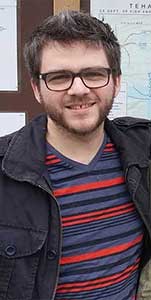MA in LCS Alum Now Ph.D. Student By Day, Salon Writer By Night
 Keith Spencer
Keith Spencer
After working as a successful freelance writer and publications manager at the California Shakespeare Theater, Keith Spencer started pursuing a Ph.D. in literature and creative writing at the University of California, Santa Cruz – a notable Ph.D. program.
Spencer, who earned a master of arts in literary and cultural studies (MA in LCS) from Carnegie Mellon University’s Department of English in 2012, is excited to start his doctoral research that will examine bureaucracy from a cultural studies standpoint.
He has three years of experience writing where he applies this kind of point of view to various topics, such as education, charitable giving and Burning Man – a temporary city of self-expression in Nevada that attracts tens of thousands each year.
Spencer credits his Carnegie Mellon education with helping him write concisely and how to consider problems from a cultural studies standpoint.
“I came out of the MA in LCS program being able to look at any object or situation and think about who was in power, who was being exploited and how those in power exploit those below them. It’s an incredibly powerful skill,” said Spencer.
Spencer’s recent article, “Why the Rich Love Burning Man,” published on Salon and Jacobin – before it went viral. As a result, several radio, TV and online shows invited Spencer on to talk about his article.
“My piece was about how a festival that has all these seemingly radical principles can sort of become a playground for the rich to some extent,” said Spencer during an interview on HuffPost Live. “I wouldn’t say it’s only rich people going there. It’s still very diverse in terms of the people who go.”
Before his work started going viral, Spencer interned for Dissent Magazine where he wrote his first article titled, “The Starbucks Recovery Act.” In it, he discusses how a Starbucks promotional pamphlet could reflect poverty, oppressions, society’s belief structures and ideas about labor and charity.
As a CMU graduate student, he worked on a research paper that included interviews with members of Occupy Pittsburgh. Spencer presented his research paper titled “Class, Race and the ‘Common Man’: Interviews with Occupy Pittsburgh” at the 2013 Modern Language Association Convention and it was later published as “Societies of Occupy: Scenes from occupied Pittsburgh” in the Journal of Urban Cultural Studies.
The research paper stemmed from three courses that he’d taken with Jeff Williams, professor of English, including ‘Introduction to Cultural Studies,’ ‘20th Century American: Mid 20th Century Fiction’ and ‘Research Outside the Book.’ Williams guided him during the research and writing process.
“Keith was not only a superb student here but makes excellent use of cultural studies: he is engaged with the culture around us and shows what it means in our social and political world,” said Williams. “In his writing since—a number of published pieces in prominent magazines like Dissent and Jacobin—he exemplifies one of the best prospects of literary and cultural studies, figuring out how to be an intellectual in contemporary culture.”
Spencer said he learned how to think about academic writing in new ways in ‘Politics and Popular Culture’ with Kathy Newman, associate professor of English.
“In this class we talked about how an author structured their work, who published it and read the indices and appendices for clues,” said Spencer. “It really helped me think about methods of structuring arguments and about the academic publishing process.”
Newman was impressed with Spencer’s approach to writing.
“He wrote a fantastic paper for my class on the history of a particular academic journal. I didn’t have to teach him how to write—he was already really good at that. But, he seemed to soak up information about how intellectuals work and how university life is structured. I love reading Keith’s journalistic writing and I can’t wait to see what he does in graduate school.”
Spencer was also a teaching assistant for ‘Reading and Writing in an Academic Context,’ the introductory writing course for students whose primary language is not English. Spencer said the position challenged him to grow as a teacher. By meeting with students one-on-one to discuss their writing, he strategized new ways of teaching writing.
Since CMU’s literary and cultural studies professors have many different interests, Spencer said the program is a good place to explore new fields and ideas.
“I think the MA in LCS program was really the perfect fit for me, especially in how it let me explore ideas that traditional English departments would not have touched,” he said. “I was thrilled that I got to interview Occupy Pittsburgh participants, write about subversive video games, interview the founders of an academic journal and write about architecture for a master’s program in an English department. It’s great for people who are ‘outside the box’ thinkers.”
Spencer is currently a part-time writer and editor for the San Francisco-based culture magazine, The Bold Italic. He hopes to continue freelance writing and secure a position in academia after he earns his Ph.D.
__
By Amanda King
Share: